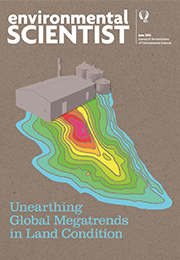No profession operates in a vacuum and it is imperative that we pay attention to emerging drivers of change.
This edition of environmental SCIENTIST explores how the European Environment Agency's eleven global megatrends are influencing the work of the land condition community. Tackling diverse topics from microplastics and antimicrobial resistance through to climate change, the journal suggests how we should be developing approaches to accommodate these momentous changes. In this way, land condition professionals, and other environmental disciplines that interact with land, can be prepared for future conditions and contribute meaningfully to sustainable development.




